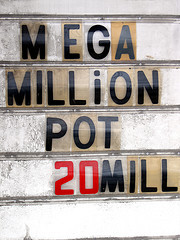Someone Fails Miserably At Trying To Pull The "Lottery" Scam On Me
Lest you think that the Consumerist batcave is somehow immune from cold-calling scammers, here’s a little story about the utter failure of a scammer who just attempted to defraud me out of a “processing fee,” in order to claim my Mega Millions winnings.
Calling from an 876 area code — not usually a good sign, unless you know people in Jamaica — a heavily accented man was very happy to let me know what I had won “$250,000 cash and a new 2012 Mercedes,” plus, I would later find out, a free year’s worth of insurance.
“That’s amazing,” I reply. “My head is exploding from the amazement I feel right now.”
“Would you like to receive your prize?”
“But of course, who would not want to have someone call them up and randomly offer them $250,000 and a new car?”
“Great… [audibly nervous] We will just need three things from you to complete the registration. Can you please go get a pencil and paper?”
“Remarkably, I happen to have a pencil and paper at hand for just such an occasion.”
“Okay, then as I said, you will need three things: A driver’s license, a photo ID, and the registration fee.”
“Isn’t a driver’s license a form of photo ID?”
This is when the call mysteriously dropped.
But I would not be kept from my completely non-existent cash and car! So I called the scammer back on a phone whose number won’t appear on his caller ID.
Surprisingly he answered.
“Hey, you just called to tell me I won a quarter million dollars then hung up on me!”
“Uh… [baby screaming in background] We had some weather here yesterday so there are problems with the phone.”
He then provides me with the mailing address for Mega Millions… Who knew that a huge multi-state lottery (which I haven’t played since I had a full head of hair) is apparently run out of a residential house in suburban Philadelphia?
Another clue that things might be amiss — aside from everything that had happened up to this point, is that the caller tells me that once I’ve taken my $275.28 (How specific!) fee to Western Union, I’ll receive the grand prize within hours — but that it will take a week to ship the car from Pennsylvania.
Now, if this had been the actual lottery calling, he would know that I live about a 15-minute drive from the supposed Mega Millions office address. He would also not have required a fee… or called at all BECAUSE THE LOTTERY DOESN’T CALL YOU TO LET YOU KNOW YOU’VE WON.
By this point, I could feel the scammer sweating from nervousness, thinking he really had a sucker on the line.
“I will need to know when you plan to go to Western Union.”
“Oh, some time in the next few hours.”
“But when?”
“Is it really that important? I think the Western Union near me is open late.” (I have absolutely no idea where the nearest Western Union is, or what its hours might be.)
“You have 12 hours to register or else the prize goes to the next person.”
“Okay, so I’ll do it within 12 hours.”
“But I need to know specifically. You only have 24 hours.”
“I thought you said 12.”
[Silence, aside from that infernal baby in the background.]
“How’sabout I give you a call in the next hour or so, let you know what my plans are. I’m a bit busy.”
He agrees, and provides me with a second number — also Jamaican — and the name of an “associate” of his.
Of course, I hang up and call the Western Union fraud hotline, where I provide them with all the information I’ve gleaned from the calls.
I also spoke with a Western Union media contact of mine, who tells me that the company has been trying to ramp up its front-end efforts to prevent scams by educating its many, many employees about the signs.
He said that just in the last week, the company actually shuttered — at least temporarily — all of its locations in Jamaica’s Montego Bay area for a systems review. A handful of these locations have since reopened, but with new limits in place to minimize the possibility of scams.
Meanwhile, I attempted to contact the police in the township where the Mega Millions non-HQ is located, if only to give them a heads-up, but was told I would probably need to contact the Philadelphia police to get an actual investigation launched.
This is part of the problem with scams that involve wire transfers. Authorities know that a crime has been committed, but if there has been no actual loss, no one seems that interested in putting in the effort to investigate.
And as we mentioned earlier this year, Western Union’s flexibility — which makes it appealing to many customers — is also something that attracts scammers.
Even if I’d wired the money (I didn’t; and won’t) as part of a sting operation, the scammer could have picked up the cash at a wide range of Western Union outlets. This would require having authorities at the ready in a huge number of locales — sometimes multiple stores within one police district — or having Western Union employees put at risk trying to detain or delay scamming customers until authorities arrive.
Want more consumer news? Visit our parent organization, Consumer Reports, for the latest on scams, recalls, and other consumer issues.


